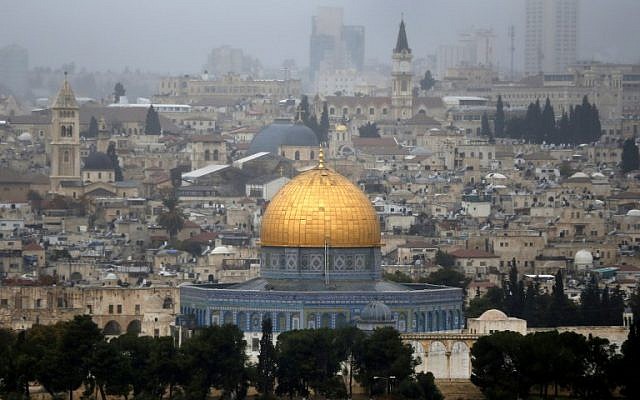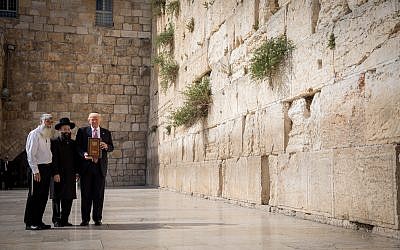Law requires special two-thirds Knesset support to approve relinquishing any portion of the city to a foreign power under any future peace deal

Lawmakers approved a bill in the early hours Tuesday that requires a special two-thirds majority vote in the Knesset to relinquish any part of Jerusalem to the Palestinians under a future peace accord.
The bill passed its second and third readings in a late night session by a majority of 64 in favor, 51 against, and one abstention.
The bill, which was proposed by Jewish Home MK Shuli Moalem-Refaeli and had the coalition backing, was designed to make it much harder to divide the city that Israel claims as its undivided capital. The Palestinians claim East Jerusalem as a capital of a future state.
The bill, an amendment to the Basic Law on Jerusalem, makes it harder for any government to divide the city by requiring 80 of the 120 MKs to support relinquishing any part of Jerusalem.
Before, the Jerusalem Law, passed in 1980 and amended in 2000, stated: “No authority that is stipulated in the law of the State of Israel or of the Jerusalem Municipality may be transferred either permanently or for an allotted period of time to a foreign body, whether political, governmental or to any other similar type of foreign body.”

With no provision in the Basic Law specifying how it can be amended, it was possible to overturn it with a simple majority.
The bill was originally proposed in the summer but did not make it through the procedural before the fall recess.
“The goal of the bill is to prevent concessions as part of diplomatic deals,” said Moalem-Refaeli at the time. “Jerusalem will never be on the negotiating table.
“The State of Israel will not allow for the establishment of a Palestinian state with its capital in Jerusalem. Get it into your heads that Jerusalem was the capital of the Jewish people and will remain the capital of the Jewish people for all eternity,” she said.
Jerusalem has been in the spotlight in recent weeks since US President Donald Trump recognized Jerusalem as Israel’s capital and said he would move the US embassy from Tel Aviv to Jerusalem.
In an address from the White House earlier this month, Trump defied worldwide warnings and insisted that after repeated failures to achieve peace a new approach was long overdue, describing his decision to recognize Jerusalem as the seat of Israel’s government as merely based on reality.

The move was hailed by Prime Minister Netanyahu and by leaders across much of the Israeli political spectrum. Trump stressed that he was not specifying the boundaries of Israeli sovereignty in the city, and called for no change in the status quo at the city’s holy sites.
The move sparked protests across the Arab and Muslim world and violent protests by the Palestinians, including a cal for a new intifada from the Hamas terror group.
Opposition lawmaker Nahman Shai (Zionist Union) criticized the new law, saying it could spark further unrest.
“We don’t need new laws on Jerusalem now, we have already seen what happens on the Temple Mount,” he said referring to widespread violence that erupted when Israel tried to impose new security procedures in the holy site after Israeli Arabs emerged from the Temple Mount compound and shot dead two Israeli policemen last summer.
“When Jerusalem burns, everything burns,” Shai said.

In May, hours before Trump arrived in Israel during his first major foray abroad as president, Netanyahu declared that Israeli sovereignty over Jerusalem’s holy sites was not up for negotiation and said the city will always be Israel’s capital.
Trump has expressed his desire to reach a Palestinian-Israeli peace agreement, which he has described as the “ultimate deal.”
In recent months the United Nations cultural body UNESCO has passed a series of resolutions that diminish or deny the Jewish connection to Jerusalem and refer to Israel as an occupying power.
Israel annexed East Jerusalem in 1980, but the move has not been recognized internationally and most countries refuse to recognize any part of the city as Israel’s capital, saying it was an issue that will need to be decided in negotiations with the Palestinians.
As reported by The Times of Israel
